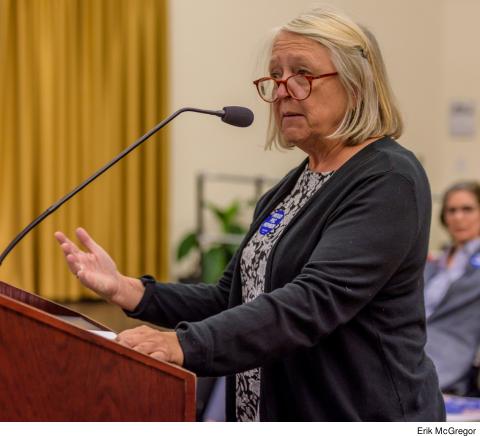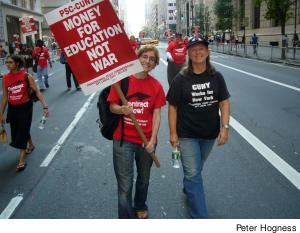A Lifetime of Unionism
 |
Debbie Bell – the PSC executive director who for two decades oversaw PSC operations, helped win major victories for union members and blazed a trail for women leaders in the New York City labor movement – retired in June.
“Every PSC member has benefitted from Debbie’s meticulous and wide-ranging work as Executive Director,” said PSC president Barbara Bowen, who hired Bell soon after the New Caucus assumed union leadership. “All of us in the labor movement are lucky that Debbie brought her formidable intelligence to the service of organized labor. Debbie Bell was essential to almost everything the PSC accomplished in her twenty years and unmatched in her command of detail. And underneath that pragmatic bread-and-butter-unionism exterior, Debbie was fueled by political commitments that made her fearless when fearlessness was needed.”
In an interview with Clarion, Bell noted that her first challenge as executive director was to work with the then-newly-elected leadership under President Barbara Bowen to modernize the office. The PSC office in 2000 had almost no computers, a newspaper that was edited by hand with a razor blade and no organizing department. Together with PSC officers, Bell went on to develop a staff devoted to research, contract enforcement, political outreach and on-campus grassroots organizing.
Building The Union
“In addition to working closely with several generations of PSC leaders in negotiating contracts, hammering out viable financial solutions and language, I am proud to have built a staff which supports and carries out an organizing approach to working with union members, as is appropriate for an activist union,” Bell said. “Over the years, that has meant working on and supporting detailed analyses of state and city budgets and legislative initiatives and campaigns to educate elected officials about members’ and students’ needs at CUNY; finding new, more effective ways of getting PSC’s message out; as well as struggling to actualize one-on-one member organizing, even among traditionally resistant full-time faculty. That work led to high participation rates in the historic strike authorization vote and a persistent 95% membership rate among all full-timers.”
Bell came to the PSC from District Council 37, AFSCME, with a reputation as a formidable union negotiator who knew the byzantine world of municipal labor relations inside and out, as someone who rose through the ranks to the top of one of the nation’s most important unions. But her political consciousness was developed early.
“I grew up in Washington, D.C., which was still a very segregated city in the 1950s and 1960s,” she said. “The rise of the civil rights movement in the 1960s and all the cultural shifts of the 1960s challenged the political assumptions I grew up with. As for many, for numerous generations, attending college was life-altering, intellectually, politically and socially. I studied urban politics and city planning at Harvard and was active in the anti-war movement there. With all the marching and shouting and disruption of those years, I treasure the friends I made, the early intellectual exposure to feminism and the weeks spent silk-screening strike posters at the Graduate School of Design with the students who created the iconic red fist that represents fightback for so many.”
But it was really her move to New York City in 1971 and her work as a sociological researcher at Columbia University that taught her about unionism. Bell organized clerical workers to join District 65 (a union with roots in the needle trades that ultimately merged with the United Auto Workers). “Workplace-based, one-on-one organizing, particularly among so-called hard-to-organize women professional and administrative workers had a satisfaction for me that anti-war organizing never did,” she said.
Starting at Dc 37
Bell then worked at the New York City Department of City Planning – which attracted many other young progressives at the time who sought to remold the city’s landscape to be more equitable – and she joined Local 375 of DC 37.
The city’s fiscal crisis in the 1970s upended economic and labor relations locally and globally, the impact of which can still be felt today. It inspired Bell to work for the labor movement full time. She started as a budget analyst and researcher at DC 37 in 1977, and worked her way up to become the first woman chief negotiator to represent the largely female union. Bell coordinated policy for the union for almost 25 years.
“At DC 37, I was involved in several critical fights that resulted in organizing opposition to the privatization of public hospitals and numerous efforts to privatize other governmental functions, from tree trimming to parking meter collections; working to defeat the more punitive aspects of national welfare reform, including organizing welfare recipients hired to ‘work’ in the NYC Department of Parks & Recreation, sometimes replacing city workers; publicizing the potential negative impact of Clinton’s ultimately unsuccessful proposed health-care reform on both public hospitals and city employees’ health coverage,” she said. “Building effective alliances with affected communities, advocacy organizations and sister unions was a particularly satisfying aspect of all this work and contributed to the work’s success.”
Bell also witnessed the move toward pattern bargaining among city unions. “On the one hand, coalition bargaining allows for strength in numbers, but, on the other hand, it has become a means of controlling a single union’s ability to win more for its members,” she said.
New Beginnings
The time at DC 37 prepared her, she said, for taking on a new role in 2001 at PSC, which had recently elected Barbara Bowen as president on an insurgent slate after years of what many members believed to be ineffective leadership against austerity at CUNY in the 1990s. Becoming executive director at a progressive union with new progressive leadership seemed to Bell the perfect opportunity to create a more forward-looking labor movement.
“When new leadership was elected at PSC, I wanted to work with them, seeing the energy with which they approached improving economic terms and conditions of faculty and professional staff at CUNY,” she said. “Yes, I thought 175 contract bargaining demands [the number in the leadership’s first bargaining agenda] was a ridiculous number, but PSC leaders were – and are – nothing if not ambitious! With every contract, accepted norms have been challenged and many of them changed for the better. The list of significant contractual improvements over the past six contracts is impressively long, and the continued effort of the union leadership to approach decision-making as a collaborative effort, while sometimes frustrating, has built the union’s strength and solidarity.”
Under the direction of the leadership and working closely with staff and members, Bell provided essential support for a lot of PSC’s accomplishments: improved pay and benefits for adjuncts, reduction of the teaching load, across-the-board pay increases, a successful strike authorization vote, parental leave and the creation of an active network of rank-and-file legislative and electoral activists.
She said, “Of the contract gains PSC has won over nearly 20 years, I am particularly proud of the role I played in achieving paid parental leave, stable adjunct health insurance, reasonably paid faculty sabbaticals, the HEO-CLT Professional Development Fund, full-time positions for certain continuing education programs and stability for employees in the Educational Opportunity Centers.”
Focus on Members
Bell is known among PSC members and staff as someone who cares more about winning victories for members than taking personal credit for the union’s accomplishments or getting quoted in newspapers. She focused tirelessly on the bread-and-butter issues that have improved union members’ economic lives in a time of intense austerity.
 |
“The work of defending members’ rights and benefits and the vision to improve them have been a collective and collaborative process at PSC over the past 20 years,” Bell said. “Enforcing those gains is day in, day out work and requires persistence, confidence and doggedness, which I try to bring to the job each day, whether the task is ensuring that members are paid correctly and on time – or as on time as CUNY can do it – that time sheets do not become tools of subjugation or that faculty workload is recorded and fully compensated. I have also worked to instill those qualities in the PSC staff, and many arrive with those qualities.”
Reliable Resource
James Davis, Brooklyn College PSC chapter chair and executive council member, said, “Debbie was a totally reliable and accessible resource for chapter chairs. With years of experience, her institutional memory is extraordinary, and she was always willing to dig up documentation, and knew exactly where things were located despite the notorious messiness of her office. She was also a tremendous asset to the bargaining team, performing a ton of uncelebrated but necessary work, real detail-oriented stuff, pushing management with firmness and principle. More than most of us, she was able to see the current PSC as a whole and in relation to its history. I will miss her.”
The union has been conducting a national search for a new executive director and has hired an executive staffing firm to assist in the effort.
Bell looks forward to spending time with her family, including her husband, prominent labor historian Joshua Freeman, a distinguished professor at Queens College and the Graduate Center – “From the day I met her, she was always the adult in the room,” Freeman said.
“Reading, maybe some writing – striving for broader intellectual stimulation – more time for music, art, movies, gardening and much more physical activity,” Bell said, when asked about her retirement plans. “I have many travel plans which I hope to get to some day.”

